出国留学 演讲课件 利弊 原因分析 精美排版
- 格式:pptx
- 大小:27.74 MB
- 文档页数:30
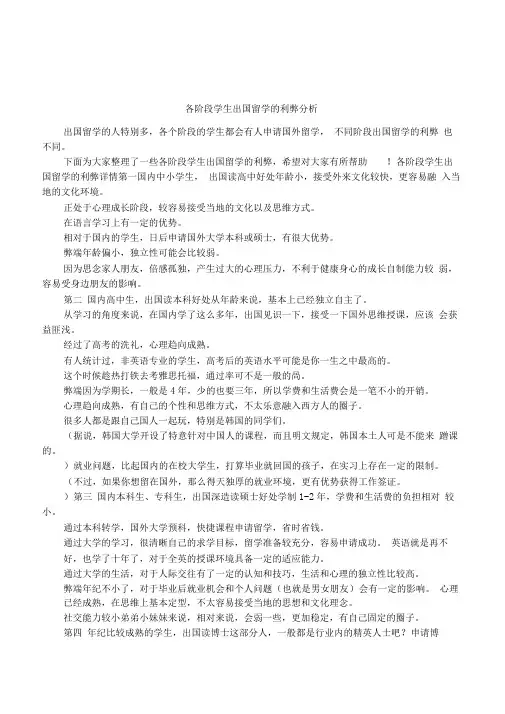
各阶段学生出国留学的利弊分析出国留学的人特别多,各个阶段的学生都会有人申请国外留学,不同阶段出国留学的利弊也不同。
下面为大家整理了一些各阶段学生出国留学的利弊,希望对大家有所帮助!各阶段学生出国留学的利弊详情第一国内中小学生,出国读高中好处年龄小,接受外来文化较快,更容易融入当地的文化环境。
正处于心理成长阶段,较容易接受当地的文化以及思维方式。
在语言学习上有一定的优势。
相对于国内的学生,日后申请国外大学本科或硕士,有很大优势。
弊端年龄偏小,独立性可能会比较弱。
因为思念家人朋友,倍感孤独,产生过大的心理压力,不利于健康身心的成长自制能力较弱,容易受身边朋友的影响。
第二国内高中生,出国读本科好处从年龄来说,基本上已经独立自主了。
从学习的角度来说,在国内学了这么多年,出国见识一下,接受一下国外思维授课,应该会获益匪浅。
经过了高考的洗礼,心理趋向成熟。
有人统计过,非英语专业的学生,高考后的英语水平可能是你一生之中最高的。
这个时候趁热打铁去考雅思托福,通过率可不是一般的咼。
弊端因为学期长,一般是4年,少的也要三年,所以学费和生活费会是一笔不小的开销。
心理趋向成熟,有自己的个性和思维方式,不太乐意融入西方人的圈子。
很多人都是跟自己国人一起玩,特别是韩国的同学们。
(据说,韩国大学开设了特意针对中国人的课程,而且明文规定,韩国本土人可是不能来蹭课的。
)就业问题,比起国内的在校大学生,打算毕业就回国的孩子,在实习上存在一定的限制。
(不过,如果你想留在国外,那么得天独厚的就业环境,更有优势获得工作签证。
)第三国内本科生、专科生,出国深造读硕士好处学制1-2年,学费和生活费的负担相对较小。
通过本科转学,国外大学预科,快捷课程申请留学,省时省钱。
通过大学的学习,很清晰自己的求学目标,留学准备较充分,容易申请成功。
英语就是再不好,也学了十年了,对于全英的授课环境具备一定的适应能力。
通过大学的生活,对于人际交往有了一定的认知和技巧,生活和心理的独立性比较高。
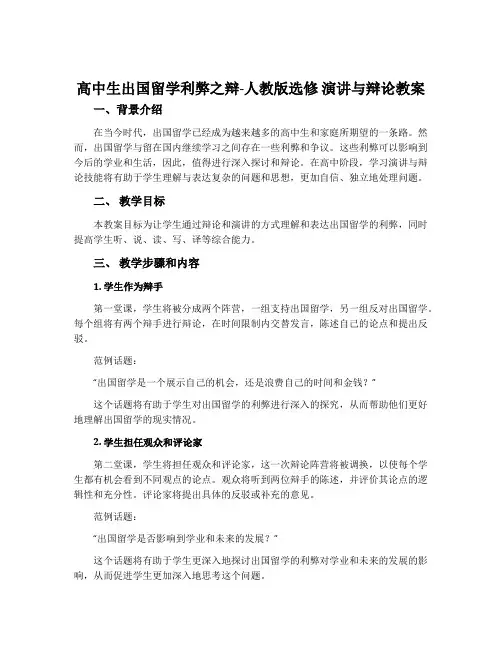
高中生出国留学利弊之辩-人教版选修演讲与辩论教案一、背景介绍在当今时代,出国留学已经成为越来越多的高中生和家庭所期望的一条路。
然而,出国留学与留在国内继续学习之间存在一些利弊和争议。
这些利弊可以影响到今后的学业和生活,因此,值得进行深入探讨和辩论。
在高中阶段,学习演讲与辩论技能将有助于学生理解与表达复杂的问题和思想,更加自信、独立地处理问题。
二、教学目标本教案目标为让学生通过辩论和演讲的方式理解和表达出国留学的利弊,同时提高学生听、说、读、写、译等综合能力。
三、教学步骤和内容1. 学生作为辩手第一堂课,学生将被分成两个阵营,一组支持出国留学,另一组反对出国留学。
每个组将有两个辩手进行辩论,在时间限制内交替发言,陈述自己的论点和提出反驳。
范例话题:“出国留学是一个展示自己的机会,还是浪费自己的时间和金钱?”这个话题将有助于学生对出国留学的利弊进行深入的探究,从而帮助他们更好地理解出国留学的现实情况。
2. 学生担任观众和评论家第二堂课,学生将担任观众和评论家,这一次辩论阵营将被调换,以使每个学生都有机会看到不同观点的论点。
观众将听到两位辩手的陈述,并评价其论点的逻辑性和充分性。
评论家将提出具体的反驳或补充的意见。
范例话题:“出国留学是否影响到学业和未来的发展?”这个话题将有助于学生更深入地探讨出国留学的利弊对学业和未来的发展的影响,从而促进学生更加深入地思考这个问题。
四、教学评估评估将由观众和评论家进行,他们将用以下标准来衡量每个学生的表现:•对话题的深入理解和实际应用•对逻辑性和充分性的认识和运用能力•对听力和表达能力的实践•对对方观点的评价和反驳能力五、思考拓展•学生可以自行提出更多的议题,将可能更适合他们的个人情况和兴趣。
•学生将被要求进行更全面的调研,以使辩论更具有说服力和理性化。
•学生可以进行更加深入和创造性的演讲表达,以增强个人的表达能力。
六、结语这个教案旨在帮助高中生理解和探讨出国留学的利弊,在帮助他们提高自己的表达和思维能力的同时促进他们的全面发展。

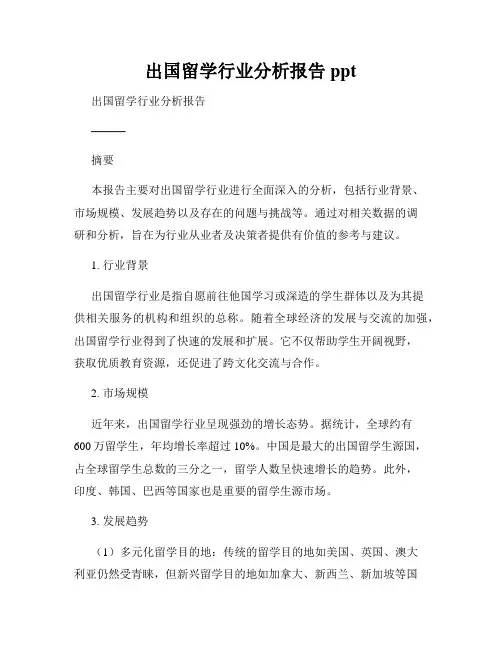
出国留学行业分析报告ppt出国留学行业分析报告———摘要本报告主要对出国留学行业进行全面深入的分析,包括行业背景、市场规模、发展趋势以及存在的问题与挑战等。
通过对相关数据的调研和分析,旨在为行业从业者及决策者提供有价值的参考与建议。
1. 行业背景出国留学行业是指自愿前往他国学习或深造的学生群体以及为其提供相关服务的机构和组织的总称。
随着全球经济的发展与交流的加强,出国留学行业得到了快速的发展和扩展。
它不仅帮助学生开阔视野,获取优质教育资源,还促进了跨文化交流与合作。
2. 市场规模近年来,出国留学行业呈现强劲的增长态势。
据统计,全球约有600万留学生,年均增长率超过10%。
中国是最大的出国留学生源国,占全球留学生总数的三分之一,留学人数呈快速增长的趋势。
此外,印度、韩国、巴西等国家也是重要的留学生源市场。
3. 发展趋势(1)多元化留学目的地:传统的留学目的地如美国、英国、澳大利亚仍然受青睐,但新兴留学目的地如加拿大、新西兰、新加坡等国家也逐渐受到留学生的关注。
学生更加注重选择适合自己专业或兴趣的目的地。
(2)专业化和个性化服务:随着行业竞争的加剧,留学机构纷纷提供更专业、个性化的服务,包括选校推荐、签证办理、语言培训等。
这些服务的提供既满足了学生的需求,也增加了留学机构的竞争优势。
(3)线上线下结合:互联网的兴起对出国留学行业产生了重大影响。
留学机构通过建立在线平台实现信息分享、预约咨询等功能,进一步提高了服务质量和效率。
然而,线下实体机构仍然是留学咨询和服务的重要渠道。
4. 存在的问题与挑战(1)高昂的费用:出国留学需要支付较高的学费、生活费用、签证费用等,给学生及家庭带来一定经济压力。
同时,留学机构也需要投入大量资源用于市场推广、师资培养等。
(2)教育质量与认可问题:留学生面临着选择合适的学校和专业的难题,而教育质量的评估和学位认可的体系也存在差异。
这给留学生和留学机构带来一定的风险。
(3)国际政策与签证限制:不同国家的政策和签证要求存在差异,留学生需要根据目的地国家的法规进行相关申请。





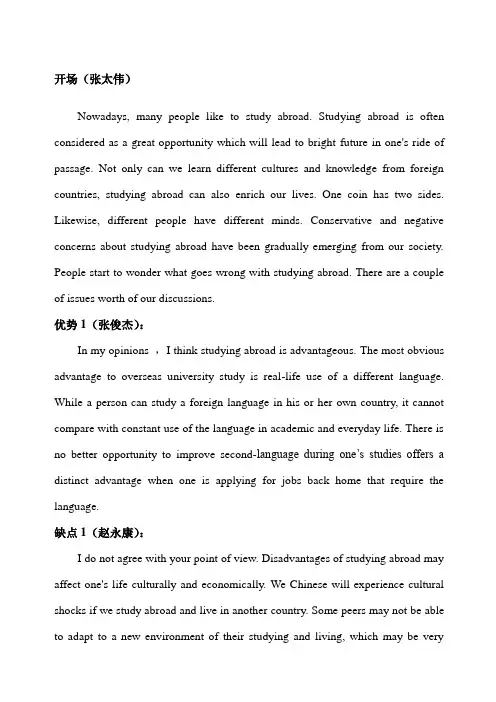
开场(张太伟)Nowadays, many people like to study abroad. Studying abroad is often considered as a great opportunity which will lead to bright future in one's ride of passage. Not only can we learn different cultures and knowledge from foreign countries, studying abroad can also enrich our lives.One coin has two sides. Likewise, different people have different minds. Conservative and negative concerns about studying abroad have been gradually emerging from our society. People start to wonder what goes wrong with studying abroad. There are a couple of issues worth of our discussions.优势1(张俊杰):In my opinions ,I think studying abroad is advantageous. The most obvious advantage to overseas university study is real-life use of a different language. While a person can study a foreign language in his or her own country, it cannot compare with constant use of the language in academic and everyday life. There is no better opportunity to improve second-language during one’s studies offers a distinct advantage when one is applying for jobs back home that require the language.缺点1(赵永康):I do not agree with your point of view. Disadvantages of studying abroad may affect one's life culturally and economically. We Chinese will experience cultural shocks if we study abroad and live in another country. Some peers may not be able to adapt to a new environment of their studying and living, which may be verydifferent from that of theirs. Life is beautiful, and it is hard. If one does not feel comfortable with the new culture of another country, he will not be happy about studying in that country.优势2(张书军):I don’t think so. Studying abroad, you learn to take care of yourself. Living in another country, even if it is with a host family, means you might be doing things you may not have done in your home country. These include cooking, cleaning, grocery shopping, washing clothes, figuring out transportation, making living arrangements, setting up accounts for cell phones and utilities, etc. You may think of this as a disadvantage, but many international students go home proud that they have become very self sufficient.缺点2(张太伟):Do you know studying abroad will cost students a great deal of living expenses? Some Chinese students are so academically successful that they receive scholarships in their studies. However, most peers who study abroad do not receive scholarships. Furthermore, they have to deal with many unexpected hardships by living away from their parents and homeland. For example, medical insurance, daily foods, clothes, rents and transportation can generate a large amount of living expenses. Often time, they need to heavily depend on their parents' overseas monthly payments.优点3(张书军):Yes, it may cost a lot of money, but do not spend money to do something?Studying abroad, you make memories that will last a lifetime. Your pictures, journals, and souvenirs will help you remember your time abroad, but your memories and emotions of this special time will also be a part of your life until you are very old.缺点3(赵永康):Don’t you know studying abroad is very hard. You will probably have times when you miss your family, friends, food, and everything familiar. Almost everyone goes through some culture shock. You will have to realize and accept that it will take some time to adjust to a new way of living.总结(张俊杰):In this debate we have not a winner, but we have a common understanding that different people have different views on studying abroad. So how can you know if studying abroad is right for you? First, start by talking to people who have already done it. Of course everyone will have his or her own experience and point of view, but it can be really helpful to hear what other people have to say. If you don't know anyone who has studied abroad, ask others about their experiences through the internet.。
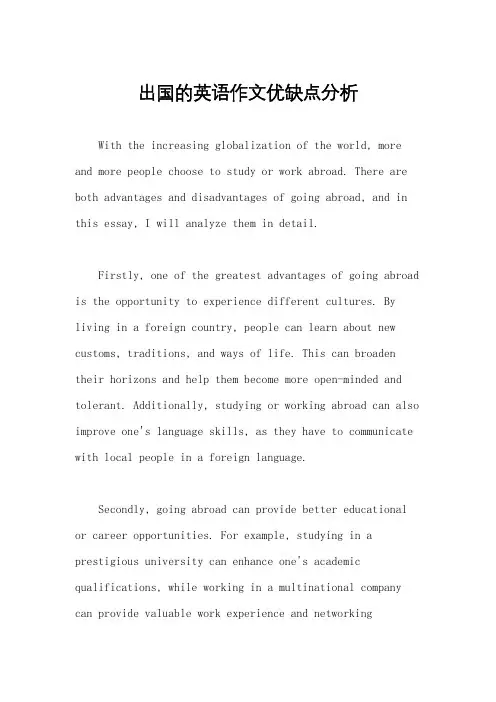
出国的英语作文优缺点分析With the increasing globalization of the world, more and more people choose to study or work abroad. There are both advantages and disadvantages of going abroad, and in this essay, I will analyze them in detail.Firstly, one of the greatest advantages of going abroad is the opportunity to experience different cultures. By living in a foreign country, people can learn about new customs, traditions, and ways of life. This can broaden their horizons and help them become more open-minded and tolerant. Additionally, studying or working abroad can also improve one's language skills, as they have to communicate with local people in a foreign language.Secondly, going abroad can provide better educational or career opportunities. For example, studying in a prestigious university can enhance one's academic qualifications, while working in a multinational company can provide valuable work experience and networkingopportunities. Moreover, living in a foreign country can also help people develop important life skills such as independence, problem-solving, and adaptability.However, there are also some disadvantages of going abroad. Firstly, people may experience culture shock and feel homesick, especially if they are not used to being away from their family and friends. They may also face language barriers and struggle to communicate effectively in a foreign language. Moreover, living in a foreign country can be expensive, and people may have to deal with financial difficulties.In addition, going abroad may also lead to feelings of isolation and loneliness. People may find it hard to make new friends or feel like they do not fit in with the local culture. Furthermore, they may face discrimination or prejudice due to their nationality or ethnicity.In conclusion, going abroad has both advantages and disadvantages. On the one hand, it can provide valuable opportunities for personal and professional growth, such asexperiencing new cultures, improving language skills, and gaining new educational or career opportunities. On the other hand, it can also be challenging, with potential difficulties such as culture shock, homesickness, language barriers, and financial issues. Therefore, people should carefully consider the pros and cons of going abroad before making a decision.。
出国的利与弊作文提纲写作
出国,好处与坏处。
好处一,眼界大开。
出国留学,最直观的好处就是眼界变宽了。
走在国外的街头,
你会发现世界真的很大,每个地方都有自己独特的故事。
不仅仅是
风景,还有人们的生活方式、思维习惯,都让你觉得新奇又有趣。
好处二,语言技能爆表。
出去一趟,别的不说,至少外语水平肯定大涨。
在国外生活,
你得用外语和人交流、购物、学习,这可比在国内死记硬背来得实
用多了。
回来之后,你就是个行走的翻译官,工作机会都多了不少。
坏处一,钱包瘦身。
不过啊,出国留学可不是一笔小数目。
学费、生活费、住宿费,加起来就是个大数目。
对于普通家庭来说,这真的是个不小的负担。
而且,万一出去之后不适应,那钱可就打水漂了。
坏处二,思乡之情浓。
离开了家乡,离开了亲人朋友,那种孤独感是真的难以言喻。
特别是在遇到困难的时候,你会特别想家,想那些熟悉的人和事。
这种思乡之情,可能会让你在国外的生活变得有些艰难。
总的来说,出国留学有好有坏,关键是要看自己的实际情况和需求。
如果你有梦想,有决心,那出国肯定是个不错的选择。
但如果你只是盲目跟风,那可能就得不偿失了。
出国的英语作文优缺点分析Title: Analysis of Advantages and Disadvantages of Studying Abroad。
Studying abroad has become increasingly popular among students seeking higher education opportunities. This trend is driven by various factors, including the desire for international exposure, academic enrichment, and career prospects. However, like any major decision, studyingabroad has both advantages and disadvantages. In this essay, we will explore these aspects in detail.Advantages:1. Cultural Exposure: One of the most significant advantages of studying abroad is the opportunity to immerse oneself in a different culture. Living in a foreign country exposes students to new customs, traditions, and perspectives, fostering cultural awareness and sensitivity.2. Language Proficiency: Studying in an English-speaking country, for instance, provides an excellent environment for language learning. Constant exposure to the language in everyday life enhances fluency and proficiency, which can be beneficial both academically and professionally.3. Academic Opportunities: Many renowned universities and academic institutions are located abroad, offering specialized programs and resources that may not beavailable in one's home country. Access to cutting-edge research facilities, expert faculty, and diverse academic perspectives can enrich the learning experience.4. Personal Growth: Living independently in a foreign country challenges students to adapt to new environments, manage finances, and navigate cultural differences. These experiences foster independence, resilience, and self-confidence, contributing to personal growth and development.5. Career Advancement: Employers often valueinternational experience highly. Studying abroaddemonstrates adaptability, cultural competence, and a global mindset, which can enhance one's employability in an increasingly interconnected world.Disadvantages:1. Financial Burden: Studying abroad can be expensive, with costs including tuition fees, accommodation, living expenses, and travel. For many students, especially those from economically disadvantaged backgrounds, financingtheir education overseas may pose a significant challenge.2. Cultural Adjustment: Adjusting to a new culture and way of life can be difficult and stressful. Students may experience feelings of homesickness, loneliness, orcultural shock, particularly during the initial stages of their stay abroad.3. Language Barrier: While studying in an English-speaking country can improve language skills, language barriers can still pose challenges, especially in academic settings where complex terminology and concepts areinvolved. Non-native English speakers may face difficulties in fully comprehending lectures or expressing themselves effectively.4. Social Integration: Building social connections in a new environment takes time and effort. Students may struggle to form meaningful relationships with locals or fellow international students, leading to feelings of isolation or alienation.5. Lack of Familiar Support System: Being away from family and friends can be emotionally challenging, especially during times of stress or difficulty. Without a familiar support system nearby, students may feel vulnerable or overwhelmed by the demands of academic and personal life.In conclusion, studying abroad offers a wealth of opportunities for personal, academic, and professional growth. However, it also comes with its share of challenges and sacrifices. Ultimately, whether the advantages outweigh the disadvantages depends on individual circumstances,goals, and priorities. Despite the potential obstacles, the experience of studying abroad can be transformative and enriching for those willing to embrace the journey.。
出国的英语作文优缺点分析As globalization continues to increase, more and more people are choosing to study or work abroad. This trend has led to a growing demand for English language skills, as itis the most widely spoken language in the world. In this essay, we will analyze the advantages and disadvantages of going abroad to learn English.Advantages:1. Better Language Proficiency: Living and studying in an English-speaking country can greatly improve one's language proficiency. By being immersed in the language, learners are forced to use it in everyday situations, which can help them to develop their listening, speaking, reading, and writing skills.2. Cultural Exposure: Studying abroad can also expose learners to different cultures and ways of life. This can broaden their perspectives and help them to understand andappreciate different customs and traditions.3. Career Advancement: Having English language skills can open up many career opportunities, especially in multinational companies or industries where English is the primary language of communication.4. Personal Growth: Living abroad can be a challenging and rewarding experience that can help learners develop independence, resilience, and adaptability. It can also help them to build confidence and self-esteem.Disadvantages:1. Cost: Studying abroad can be expensive, with tuition fees, accommodation, and living expenses all adding up. This can be a barrier for some learners, especially those from low-income families.2. Homesickness: Being away from home and family can be difficult, and learners may experience feelings of homesickness, loneliness, and isolation.3. Culture Shock: Moving to a new country can be a culture shock, as learners may struggle to adapt to new customs, traditions, and ways of life. This can be overwhelming and stressful.4. Language Barrier: Learners may also struggle with the language barrier, especially if they are not proficient in English. This can make it difficult to communicate with locals and make friends.In conclusion, going abroad to learn English has both advantages and disadvantages. While it can improve language proficiency, expose learners to new cultures, and open up career opportunities, it can also be expensive, lonely, stressful, and challenging. Therefore, learners should carefully consider their goals, resources, and personal circumstances before making the decision to study abroad.。